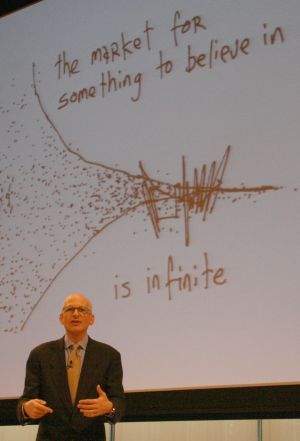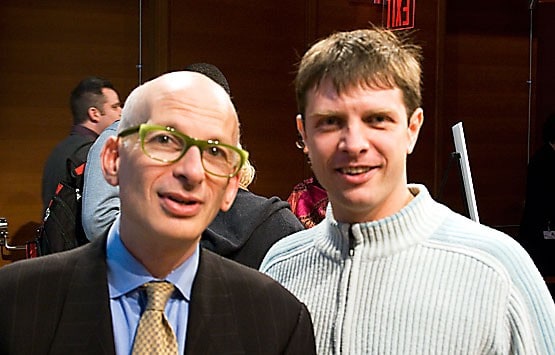This is an interview I did with Seth Godin when the Tribes book came out way back in 2008. Until now it resided on our Estonian web site as we didn't have the English site. I decided to copy it here so that all our English content could be found on the same site. If you haven't seen it before, enjoy.

- The Icarus Deception: How High Will You Fly?
- Linchpin: Are You Indispensable?
- Permission Marketing: Turning Strangers into Friends and Friends into Customers
- Purple Cow, New Edition: Transform Your Business by Being Remarkable
Some of them are free Unleashing th Ideavirus and Knock Knock.
On 22 October 2008 Seth introduced his new book Tribes: We Need You to Lead Us. The presentation was excellent in helping to better understand the the idea behind the book. It is not just a marketing book. It's about leadership. How leading a tribe is a much more rewarding activity than just trying to yell at them. You can find the audio of the presentation here and the slides here (slides are with notes):
If you take marketing seriously check these out. It is a time well spent.
Few weeks ago you helped us to put together a bunch of questions for Seth and here are the answers:
Your last book about tribes is leadership-marketing-motivational. Are product/marketing related tribes created or they just happen? If marketer tries to create a tribe, isn't that just another trick to push his product?
Seth Godin: No one accidentally joins a tribe, and if we're tricked into it, we won't stay for long. But yes, it's clear that some politicians and marketers are able to intentionally create tribes.
Marketers are afraid that if they let people to talk freely then a lot of negative will be said, that will erode the brand and all kinds of bad thins will happen. How would you respond to that?
SG: They're right. Things will be said. If you create a movement that's honest and a product that matters, those things will be largely positive. The only other choice is to be ignored, and we know that this doesn't work very well.
It seems to me that to be remarkable and gain permission you need to know what people want, but for that you need to talk to people who haven't yet given permission. Do you just do something hoping it will be a hit rather than a miss?
SG: I think the art is in understanding what people want, not running a focus group and having them tell you what they want. Smart marketers have an empathy that allows them to do this.
SG: Spam always works in the short run, but it fades out very quickly. The long term win is in building a tribe, and since it's not limited by geography any longer, that tribe can be larger than Estonia.
The long term win is in building a tribe.
You have said that we need meatballs (average products for average people). To market meatballs you need to do things the old way and spam people. This is going to be less and less effective so the meatball model won't work and we don't have metaballs… Do you see some kind of equilibrium developing between old and new (spam and permission)?
SG: I think it's likely that society will accept a certain amount of spam as background noise. It won't ever go away. The opportunity for growth, though, doesn't lie in doing something that people merely tolerate. The real wins will come, over and over, from marketers who are welcomed, not shunned.
TV-Industrial complex is/was a repeatable model. What can you say about a new model emerging to replace that. Is there a model? Do this, then that, profit?
SG: Do something worth talking about. Word spreads. Make a profit. Repeat. Along the way, earn permission to make it easier to spread the word next time.
Media is atomizing. Currently you can buy ads in a TV channel, a news paper and a few billboards. If we need to use thousands of channels to deliver relevant message is this going to be all automatic (like Google AdSense).
SG: I think ad buying is not ready for a one-stop shop, but there's no doubt that much of it will be consolidated and automated….
What will happen to the traditional media?
SG: Media doesn't go away, it just evolves.
Are you wearing mis matching socks all the time or just on the events?
SG: I wear mismatched socks every single day. It's a nice reminder.
Questions from our readers:
Lembi Sander: How to market a DVD of a small theater, so that it would get attention and be remarkable?
SG: The question isn't how to market the DVD. The question is how to change the theater. What would the theatre have to become in order to earn the expectation that people would talk about it?
Silja Oja: The market is down, sales are down and the company is in the red. What would you suggest to a marketer, where to focus their efforts?
Seth Godin: This is a great opportunity to build relationships, to lead a tribe, to create a movement. Everyone else is scared and quiet, looking for leadership. That should be you.
Peep Laja: What do you think is the best way to develop relationships (online) with potential and current clients?
SG: Do things for people. Relentlessly. Be helpful, be generous. Don't ask for anything in return!





